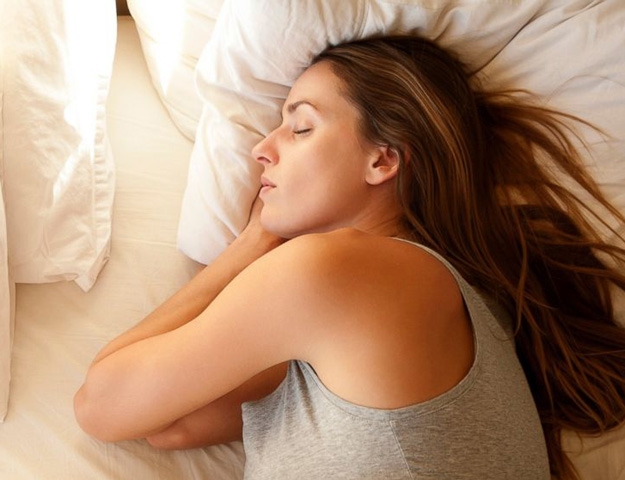
Use mouthwash
Brushing and flossing are important, yes, but that's not all you should be doing. "While we sleep, we produce less saliva and our mouths become dry. Saliva is the body's natural neutraliser of the cavity-causing acids that are byproducts of food and bacteria," explains to Scott B Eisen, DDS.
Therefore, use mouthwash – not as a replacement for brushing and flossing but a healthy defense against bacteria and plaque. "Using an antiseptic or fluoridated mouthwash at night can help maximise benefits, without them being washed away by food and drink," says Dr Eisen. The type of mouthwash will depend on your specific needs. "
Go to bed at the same time every night
A lot of important things go on in us while we're snoozing, so it's important to keep a consistent sleep schedule. "Long term health depends on the regeneration that occurs during deep sleep," says naturopathic doctor Jacqueline Blakely.
Sleep takes care of important functions such as liver cleansing, muscle building, tissue regeneration, the breakdown of fat stores and normalisation of blood sugar. "Sleeping at odd hours and at different times messes up our natural sleep cycle," says Dr Blakely. Sleeping and waking at the same time trains our body.
Too much sleep may be symptom of dementia, researchers say
Snack on this combo
You should eat fibre, protein, and healthy fats at night if you're going to snack says Jillian Michaels, health and wellness expert. "These promote satiety and contain tryptophan which aids in better sleep and mood," says Michaels.
Sugar, starch, or fried and fatty foods are combos you must steer clear from at night. "These drive up insulin levels, causing restless sleep and interference with the release of HGH, our immunity boosting, anti-aging, fat-burning hormone," says Michaels. Fried or fatty foods result in delayed gastric emptying and could lead to an upset tummy or bloating, causing more tossing and turning instead of snoozing.
Do some yoga
"The tension in our tissues compounds over time and plays a significant contributing role in back and hip pain," says Tiffany Cruikshank, founder of Yoga Medicine and author of Meditate Your Weight. To prevent issues in the future, get flexin’ with some yoga.
One easy pose you can do at home is the supine hamstring pose, wherein you lie on your back and loop a towel around the ball of your right foot and extend it in front of you. Bend the raised leg if your leg is lower than the height of your hips to put a little pressure on your hamstrings.
Take calcium
Calcium and magnesium are the dynamic duo if you want to sleep well. "Your body uses calcium at night to relax your muscles and boosting sleep by helping your nervous system," says Dr Cole.
Drink hot lemon water
According to personal trainer Devan Kline, nighttime is ideal sipping lemon water. "Having a glass of lemon water before bed will help create alkalinity in your body. With the majority of our foods being highly acidic, it's important to constantly balance your PH level," he says. "Disease has a lot tougher time thriving in an alkaline environment rather than acidic. Lemon water will help you combat acidity," he claims.
Pink noise is here and it can make you sleep better
Cut back on caffeine (dark chocolate too)
Caffeine has a six-hour half-life, which means it can take nearly twenty-four hours to work itself out of your system. Also, that coveted piece of dark chocolate might be full of healthy benefits but Michael Breus, author of The Power of When says that a two-ounce chunk of 70% dark chocolate has 70 mg of caffeine, about the same as a shot of espresso which is not exactly a nighttime drink.
Power down
Lower your body temp, blood pressure and levels of the stress. This downshift should occur the hour before bedtime and includes three 20-minute sections. “In the first 20 minutes, do things you must get done. If you don't you will think about them while you're trying to fall asleep," says Dr Breus.
In the next 20 minutes, "Do your nightly hygiene routine, which may include taking a hot bath or shower-in a dimly lit room or one with the special sleep bulbs which filter out blue wavelength light," suggests Dr Breus.
In the last 20 minutes, try doing relaxing activities like light stretching or reading. Don’t forget to switch off the electronics! Have casual conversations with friends and family. You can play cards or games or meditate, pray or read scripture.
Have something to add to the story? Share it in the comments below.





1732308855-0/17-Lede-(Image)1732308855-0-270x192.webp)











COMMENTS
Comments are moderated and generally will be posted if they are on-topic and not abusive.
For more information, please see our Comments FAQ